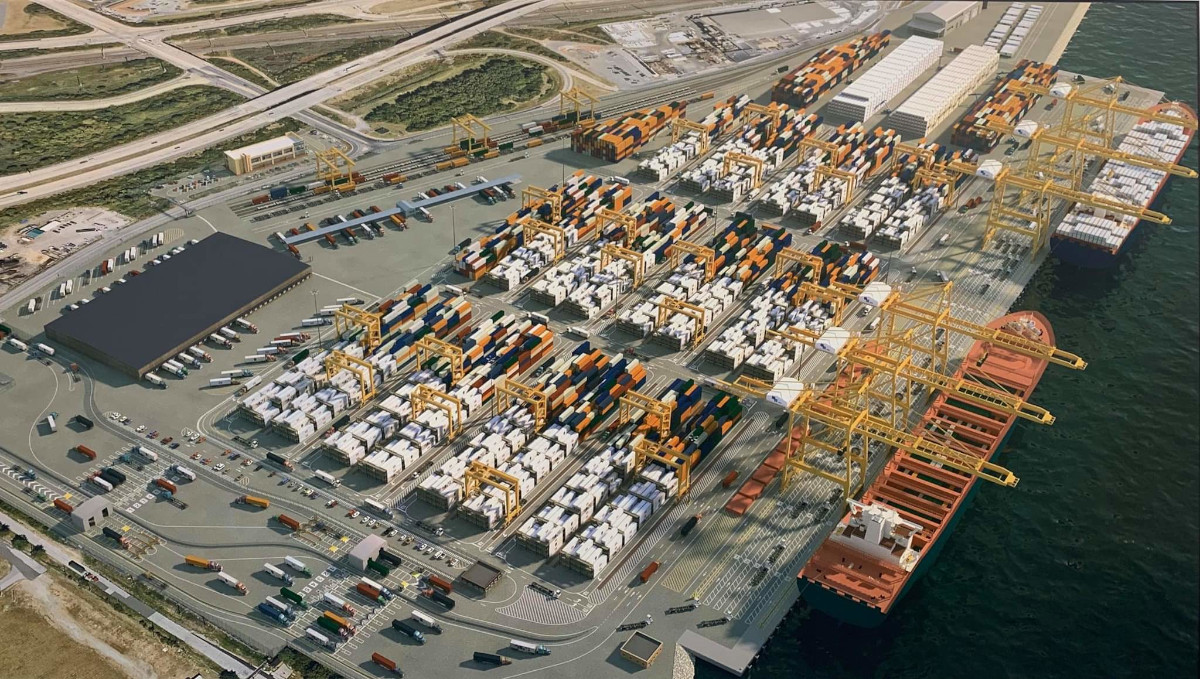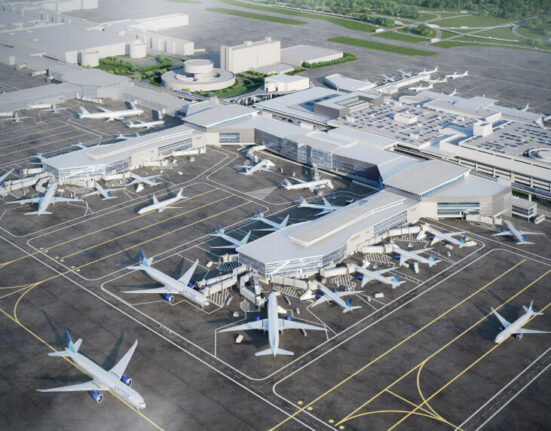The Edgemoor Container Terminal will be about twice as big as the current port’s capacity. | PHOTO COURTESY OF GULFTAINER
WILMINGTON – The Port of Wilmington received a significant boost Friday when it was selected for a $50 million federal grant to support upgrades and the build-out of the future Edgemoor container port.
The funding from the U.S. Department of Transportation’s Maritime Administration’s Port Infrastructure Development Program (PIDP) comes on the heels of the state’s switch of operators at the port after progress on Edgemoor had not materialized.
The former Chemours titanium dioxide plant is now largely acres of asphalt along the Delaware River, but could soon be a state-of-the-art port. | DBT PHOTO BY JACOB OWENS
Boston-based Enstructure was selected by the state-appointed Diamond State Port Corporation to take over the Port of Wilmington’s operations from Emirati company Gulftainer, which had fallen on financial difficulties and failed to make investments at the former Chemours titanium dioxide production campus along the Delaware River that state officials have targeted for a new deepwater port.
In obtaining a long-term lease for the Port of Wilmington, Enstructure agreed to invest $21.5 million to move the 100-acre Edgemoor project ahead and include its adjacent 25-acre, waterfront parcel that is currently home to its Port Contractors Inc. subsidiary to the port plans, increasing the project’s shoreline by about 45% and its total acreage by 30%.
Gov. John Carney has likewise committed $50 million from the state’s American Rescue Plan Act funds to advance Edgemoor.
Combined with the PIDP funds approved Friday, it means that Edgemoor now has more than $120 million committed to get the project moving, but it will likely need to identify further funding support. Gulftainer’s original cost estimate for the project was $500 million.
“This [PIDP grant] is a significant critical federal investment that will help to modernize and upgrade our existing port and to help build a new state-of-the-art container port on the river in Edgemoor,” U.S. Sen. Chris Coons, who had lobbied the Biden administration on behalf of the project, told Delaware Business Times. “This is something our business community has wanted for years. The first meeting I was in about modernizing and expanding the port I was county executive – that’s how long it’s been.”
The Port of Wilmington had unsuccessfully applied for funding from the PIDP at least twice in the past, Coons said, but the combination of new operational leadership, local investment and a smaller funding request than prior cycles likely helped it succeed now.
The investment is expected to spur upward of 1,000 new high-skilled, high-wage union jobs at the existing and future port, Coons said. It also will help to electrify cranes and vehicles on the port to reduce its carbon footprint, while implementing new gates and security features to protect the assets on the facility.
“This is putting Delaware on the map as a shipping receiver and sender in the region,” said Jim Maravelias, president of the Delaware State AFL-CIO that includes the International Longshoremen’s Association (ILA), in a statement. “The expansion will create well-paying jobs for generations to come, and this monetary boost is exactly what Delaware needs at this moment in time.”
Enstructure took over the Port of Wilmington that had been reeling with issues under its prior ownership in July. | DBT PHOTO BY JACOB OWENS
Having met with senior leadership from Enstructure, Coons said that he has been impressed with the new operators to date.
“Enstructure strikes me as a much more grounded team that has a great deal of experience in ports of our size and our particular market share,” he said, noting that he was hopeful for Gulftainer’s success, but thought it didn’t have the same experience for a smaller port.
The grant comes as part of a PIDP package of more than $172.8 million for 26 small ports across the country to improve and expand their capacity to move freight reliably and efficiently, thereby boosting local and regional economies while protecting surrounding communities from air pollution.
“Everything from the food we eat to the cars we drive to the lumber and steel used to build our homes passes through America’s ports, making them some of the most critical links in our nation’s supply chain,” U.S. Secretary of Transportation Pete Buttigieg said in a statement announcing the grant. “These investments will help expand capacity and speed up the movement of goods through our ports, contributing to cleaner air and more good-paying jobs as we go.”






